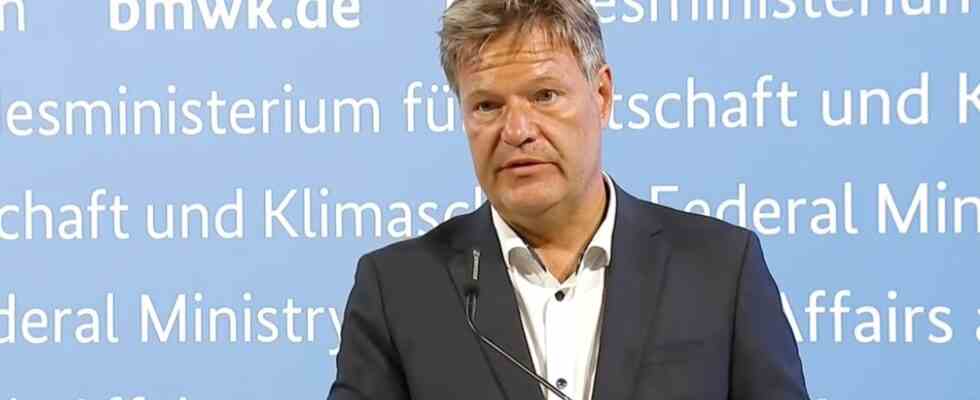Status: 08/15/2022 5:29 p.m
A surcharge of 2.4 cents per kilowatt hour of gas – burdensome for many people, but necessary and as fair as possible, Minister Habeck defends the instrument. Social associations, opposition and unions are demanding more help.
Federal Minister of Economics Robert Habeck defended the gas surcharge as the fairest of the possible options. However, it is clear that the resulting additional costs for some people could overflow the camel’s back financially – “and it must not overflow,” said Habeck in Berlin. To relieve these people in a targeted manner is now “the task of the hour”.
Habeck did not give details of possible relief. He referred to announcements that Chancellor Olaf Scholz had already made. Accordingly, in addition to further tax breaks, changes in housing benefits, benefits for students and pensioners and people with low incomes are planned.
If the previously planned around 2.4 cents per kilowatt hour of gas still have to be taxed, the federal government will create a compensation mechanism for this, said Habeck. However, he cannot yet give any details as this is the responsibility of the Ministry of Finance. The federal government is currently trying to find an exception in the EU so that it does not have to add value added tax to the gas surcharge.
Habeck: Allocation was the only implementable instrument
Habeck defended the calculation of the levy by Trading Hub Europe GmbH, a joint venture of the gas network operators. The calculations of the “guardian of the infrastructure” were “strictly checked” by auditors and the Federal Network Agency. In the future, it will be adjusted to market developments every three months – that means it could rise, but also fall.
Habeck also defended the instrument of the levy as such. A tax-financed rescue of the gas suppliers, Habeck hinted, would not have been feasible in the governing coalition. When asked by a journalist whether this meant the FDP, which categorically ruled out tax increases, Habeck did not specifically respond.
So the only question was whether there should be a surcharge for all gas customers or only for those whose suppliers had signed contracts for Russian gas. The latter would have led to “social imbalances” – that’s why the government decided to spread the levy more broadly. The solution found is the fairest of the possible options.
Trade unions and social organizations are demanding more help
The trade union ver.di fears existential difficulties for many households from autumn. Ver.di boss Frank Werneke called for the gas price to be capped for normal consumption. The costs for this should be frozen for consumers at the 2021 level and the additional costs for suppliers should be borne by the state. From Werneke’s point of view, “tinkering with the income tax rate” would not help people.
Ulrich Schneider, head of the Parity Welfare Association, said: “There is no need for a relief package for everyone, but rather a large package for the poor.” Specifically, the association calls for the standard rates of social benefits to be increased and housing benefits to be expanded. This must be done immediately, not just next year.
For the Left Party, the gas surcharge is “completely the wrong way” because it places a one-sided burden on consumers. Party leader Martin Schirdewan again called for an excess profit tax for crisis profiteers and war profiteers who would have to “bear their fair share of the burden of the crisis”.
Companies are also worried about additional workloads
Business is also complaining about the financial burden: According to calculations by the German Economic Institute, the gas levy will cost industrial companies around 5.7 billion euros. The chemical and metal industries are particularly affected because they consume a lot of energy.
CDU leader Friedrich Merz criticized the federal government’s handling of the levy. Millions of gas customers would have to be informed by letter about the levy, the amount of which has not yet been determined due to the unresolved question of taxation.
gas distribution and reactions
Martin Polanski, ARD Berlin, August 15, 2022 5:35 p.m

